Farming Simulator 22: Potatoes and beets
On this page of the Farming Simulator 22 guide you will read about the cultivation and use of potatoes and beets.
Last update:
The following page focuses on the cultivation of potatoes and sugar beets in Farming Simulator 22. You will learn how to plant potatoes, what machines you need to harvest these plants, how to use potatoes, and how to process beets into sugar.
What do you need?
Both potatoes and beets (root plants) are slightly different from each other, but also have many features in common:
- Medium/large tractor - we recommend plowing when cultivating both vegetables, although a cultivator will be enough. However, a strong tractor will be useful for working with harvesters attached to the tractor.
- Cultivator or plow - instead of a plow, you can use a subsoiler or spaders; instead of a cultivator, you can use disc or mechanical harrows. Plowing will increase the yield.
- A regular seeder is enough for planting beets. For potatoes, however, you will need a special seeder (you can fill it with potatoes from the harvest),
- Special potato/beet harvesters. Both plants have independent self-propelled machines, but there are also sets that can be attached to a tractor.
- Shearer - before harvesting, you need to cut the foliage. Self-propelled combines are equipped with shearers. There is nothing to prevent you from using a tractor together with a harvester and a shearer at the same time. Beet and potato shearers can't be used interchangeably.
- Large trailer - both plants generate very high yields, up to 100,000 liters or more.
- fertilize the field twice,
- Do soil rolling immediately after sowing,
- Make mulching before cultivation/plowing,
- Do not let the weeds grow,
- Do not harvest in the rain,
- Plowing increases the harvest by 15%.
To maximize profits:
You can't keep these plants in a silo. It is worth putting them under the carport or on the ground and collecting with a belt system that automatically lifts products off the ground and loads them onto trailers.
Potatoes
Description of works
You can plant potatoes only by using special seeders. You can fill them with potatoes from the previous harvest. This way, you will save on seeds.

After planting the potatoes, wait for them to grow - on the map, you will see a new status - Remove foliage. It is not possible to harvest potatoes and beets as long as their upper part growing above the ground is visible.
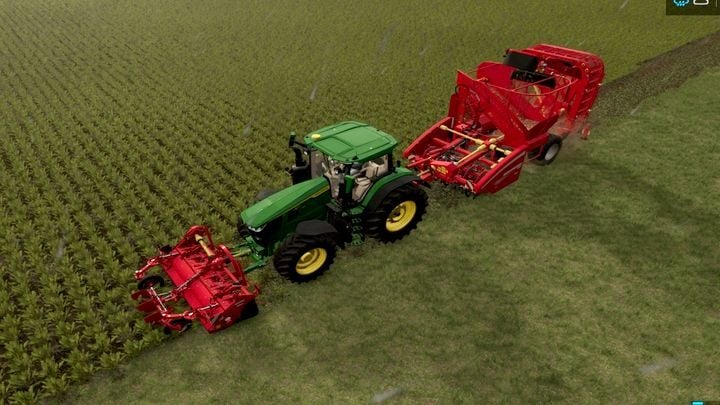
Cut the foliage with special shearers from the Potato Technology category. You attach them to the front of the tractor; you can also attach one of the available harvesters to the rear. However, keep in mind that the shearer works over a wider field - the employees will have problems with performing this task correctly.
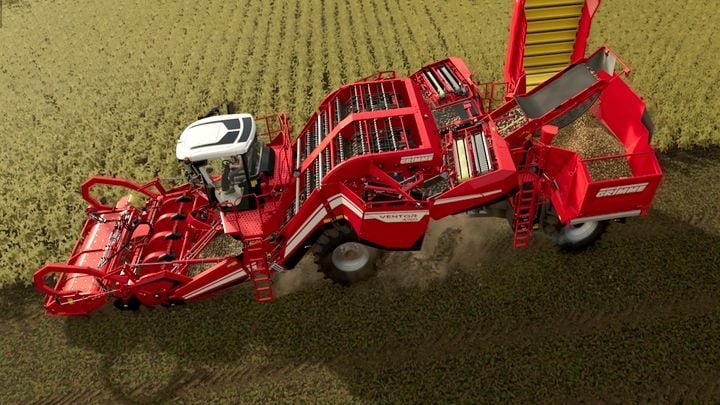
A self-propelled harvester works quickly and efficiently. It also has its own shearer. The downside? Price - almost €410,000. This harvester is not suitable for any other work.
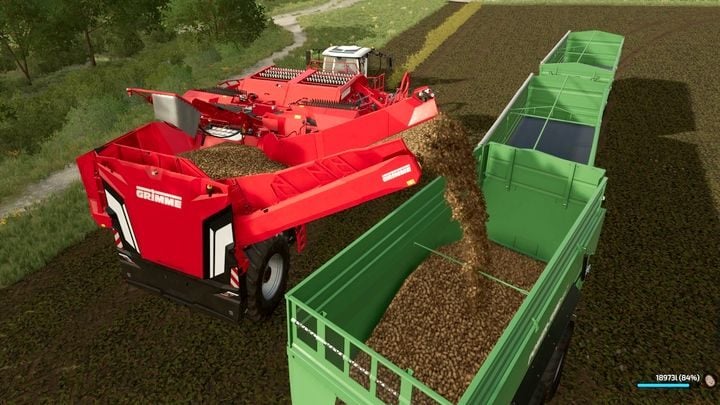
When unloading both types of harvesters, you need low trailers - the conveyor belt has limited vertical maneuverability. In this case, the option of connecting trailers works great. Alternatively, you can use long semi-trailers. In the store, you can also find an auger trailer for potatoes. Either way, you will need a huge capacity.
Make sure you have the all-wheel-drive control enabled in the self-propelled harvester - it also has only the turning wheels, so despite its size, it is very maneuverable and easy to drive.
The yield of potatoes is close to 80,000l/hectare.
Usage
Potatoes have only one use outside the sale - it is food for pigs. Although not very effective, one harvest will give you enough food to last for years.
Sugar beets
Description of works
Sugar beets are similar to potatoes in this regard. First, you have to plant them - preferably in a plowed field to increase the yield by 15% by using one of the standard seeders.
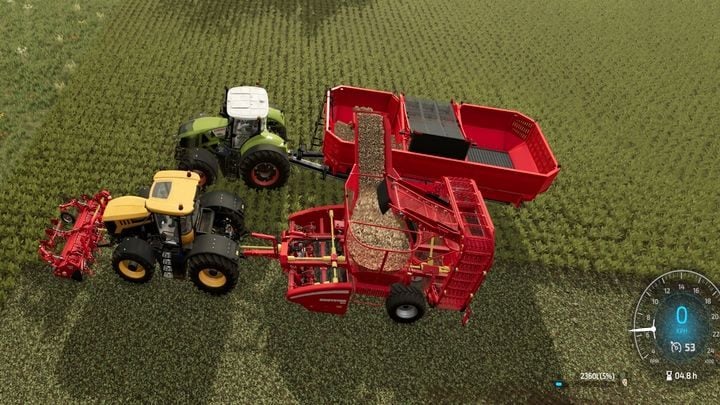
After performing the optional maintenance work, you have to cut the foliage, just like with potatoes, before you can pull the vegetables out of the ground. You use a shearer or a self-propelled harvester for this - unlike a potato harvester, you usually need a header. All headers are compatible with the available harvesters.
Don't make a mistake when buying a shearer - the one for potatoes will not work with beets and vice versa.
This time, however, you will have an easier time working with a tractor - the width of the shearer and harvester are the same. In addition, the belt for unloading beets is placed higher, allowing you to unload them to larger trailers. The disadvantage, however, is the very small capacity of the harvester - you will have to empty it numerous times.
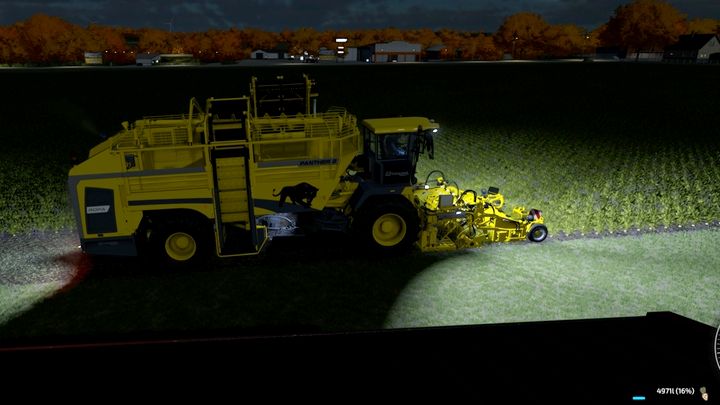
There are a few self-propelled harvesters for beets. The bigger it is, the harder it is to maneuver, but it also has bigger capacity. However, there is no need to overpay - even the cheapest self-propelled harvester should meet your requirements.
Beet yield is close to 110,000l/hectare.
Beet pulp
You can sell all of the beets or some of them as beet pulp at the biogas plant - they will be processed into digestate just like silage. You can also sell beet pulp in a biogas plant for a better price.

To obtain beet pulp, use a special front loader cap - Fliegl Ruby 2000 (it is also used as a regular bucket). Once the beets are picked and the shredding function is activated, you will get chopped beets that you can pour straight into the trailer.
Usage
- You can feed them to pigs.
- It is used in the production of sugar (500l of beets -> 250 of sugar). Sugar is used in baking cakes and chocolate.
- Shredded beets improve sugar production (500l of shredded potatoes -> 300 of sugar)
- They can be sold and processed (after chopping) in a biogas plant (1,010l of beet pulp -> 303l of digestate).
- Farming Simulator 22 Guide
- Farming Simulator 22: Game Guide
- Farming Simulator 22: Plants - machinery, harvest
- Farming Simulator 22: Field work - plants
- Farming Simulator 22: Grains - wheat, oats, barley, sorghum
- Farming Simulator 22: Canola and soybeans
- Farming Simulator 22: Sunflower and corn
- Farming Simulator 22: Potatoes and beets
- Farming Simulator 22: Sugarcane
- Farming Simulator 22: Cotton
- Farming Simulator 22: Crop comparison and profitability
- Farming Simulator 22: Field work - plants
- Farming Simulator 22: Plants - machinery, harvest
- Farming Simulator 22: Game Guide
You are not permitted to copy any image, text or info from this page. This site is not associated with and/or endorsed by the developers and the publishers. All logos and images are copyrighted by their respective owners.
Copyright © 2000 - 2025 Webedia Polska SA for gamepressure.com, unofficial game guides, walkthroughs, secrets, game tips, maps & strategies for top games.
